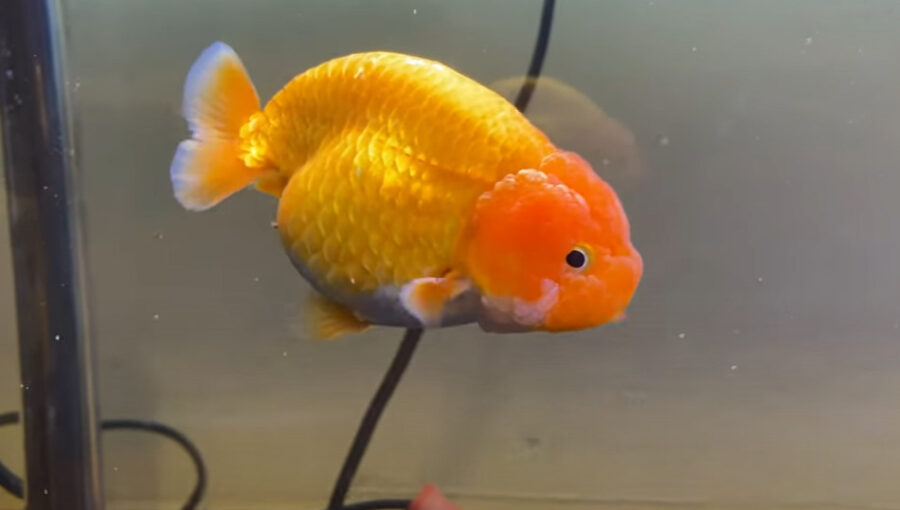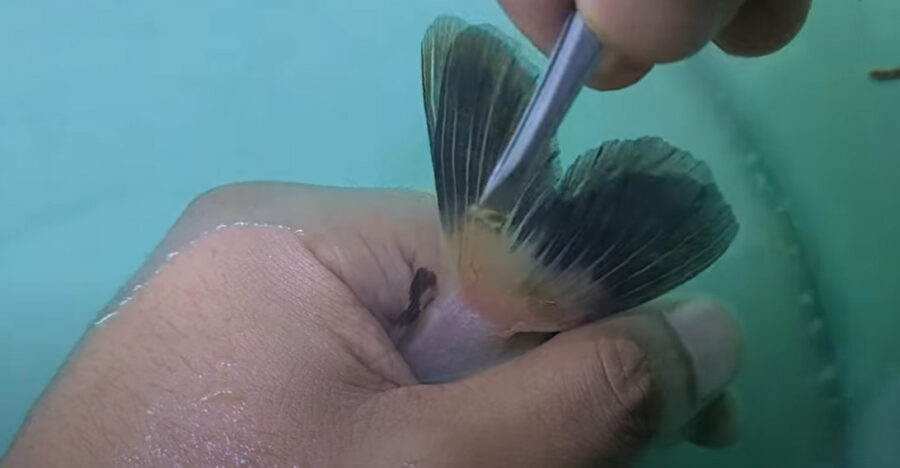Are you worried that your goldfish has worms? Can goldfish get worms?
How can you tell? What do you need to do? Will they go away by themself?
Find out below
Can Goldfish Get Worms?
Yes, Goldfish, like many other fish species, can indeed be affected by various types of worms. These parasites can cause health issues and discomfort for our beloved finned friends if left untreated.
It’s important to be aware of the different types of worms that can affect goldfish and the associated symptoms to ensure early detection and prompt treatment.

Below is a list of worms that could affect your goldfish
Flukes (Trematodes)
Flukes are flatworms that can infect goldfish. They typically reside on the skin, gills, and internal organs of the fish. Fluke infestations can lead to irritation, respiratory problems, and overall compromised health.
Tapeworms (Cestodes)
Tapeworms are segmented worms that can infect the digestive system of goldfish. These worms are usually contracted through the ingestion of intermediate hosts, such as aquatic invertebrates. Tapeworm infections can cause weight loss, malnutrition, and digestive disturbances.
Roundworms (Nematodes)
Roundworms are cylindrical worms that can infect the digestive system and other internal organs of goldfish. They are commonly contracted through the ingestion of contaminated food or water. Symptoms of roundworm infestations include weight loss, bloating, and abnormal feces.
Anchor Worms (Lernaea)
Anchor worms are parasitic crustaceans that attach themselves to the skin and fins of goldfish. These parasites can cause irritation, wounds, and secondary infections. Anchor worm infestations are visible to the naked eye and require immediate treatment.
Camallanus Worms
Camallanus worms are thread-like nematodes that can infect the digestive system of goldfish. These worms are often contracted through the ingestion of infected intermediate hosts or contaminated water. Infected goldfish may exhibit weight loss, abdominal swelling, and abnormal behavior.
How to Tell if Your Goldfish Has Worms
there are some signs and symptoms that can indicate a potential worm problem. Here are some indicators to look out for:
Changes in Appetite
Goldfish infected with worms may exhibit a decrease in appetite or a sudden increase in hunger. If you notice your goldfish showing abnormal feeding behavior, it could be a sign of a worm infestation.
Weight Loss
Worms can cause weight loss and malnutrition in goldfish. If you observe your goldfish becoming noticeably thinner or see a significant decrease in their body condition, it could indicate the presence of worms.
Swollen or Bloated Appearance
Certain types of worms, such as roundworms, can cause bloating and distension in the abdominal area of goldfish. If your goldfish appears swollen or unusually bloated, it may be a sign of a worm infestation.
Changes in Feces
Worms can affect the digestive system of goldfish, leading to changes in their feces. Look for any unusual discoloration, stringy or white strands, or mucus-like substance in their waste.
Abnormal Behavior
Infected goldfish may display abnormal behavior such as lethargy, increased bottom-sitting, or rubbing against objects in the tank. These behavioral changes can be an indication of discomfort caused by worm infestations.
Visible Worms
In some cases, you may be able to spot worms directly on the goldfish’s body or in the tank water. Anchor worms, for example, appear as long, white, thread-like structures protruding from the fish’s skin. However, many worm infestations are not easily visible without the aid of magnification or professional examination.

How Did My Goldfish Get Worms
Goldfish can get worms through various sources, and it’s important to understand how these parasites can find their way into your aquarium. Here are some common ways your goldfish may have acquired worms:
Contaminated Food or Live Feed
If you feed your goldfish live or frozen foods such as worms, brine shrimp, or tubifex, there is a risk that these food sources might be carrying worm larvae or eggs. If the live food or frozen food is not properly sourced or handled, it can introduce worms into your goldfish’s digestive system.
Contaminated Water
Worm eggs or larvae can enter your aquarium through contaminated water. This can occur if you use untreated tap water, water from natural sources like ponds, or if you introduce plants, gravel, or other materials that are carrying worm eggs or larvae. Additionally, if you house your goldfish with other fish that are infected with worms, there is a possibility of cross-contamination.
New Fish or Invertebrates
Introducing new fish or invertebrates to your aquarium without proper quarantine and observation can be a potential source of worm infestation. These new additions may already be carrying worms, and if not properly isolated and treated, they can transmit the parasites to your existing goldfish.
Poor Water Quality
Maintaining good water quality is essential for the overall health of your goldfish. Poor water conditions can weaken their immune system, making them more susceptible to infections, including worm infestations. Additionally, inadequate filtration or irregular water changes can create an environment favorable for worm growth and reproduction.
External Contamination
Some worms, like anchor worms, can attach themselves to the skin and fins of goldfish. These parasites can be introduced through contaminated objects, plants, or even wild fish or birds that come into contact with your aquarium
What to Do if Your Goldfish Has Worms
If you suspect or confirm that your goldfish has worms, it’s important to take prompt action to treat the infestation.
Here are some steps you can take if your goldfish has worms:
Quarantine
If you have multiple goldfish in the same tank, consider isolating the infected fish in a separate quarantine tank. This will help prevent the spread of worms to other healthy fish and provide a controlled environment for treatment.
Medications
Your veterinarian may prescribe anti-parasitic medications to eliminate the worms. These medications can be in the form of medicated food, liquid treatments, or baths. Follow the veterinarian’s instructions carefully regarding the dosage and application method.
Be aware that some medications may have an impact on the beneficial bacteria in your tank, so monitor water parameters during treatment and consider using a bacterial supplement if necessary.
Water Changes and Cleaning
Regular water changes and tank cleaning are essential during the treatment process. Clean the tank, including gravel, decorations, and filtration equipment, to remove any potential sources of reinfection. Be cautious not to disrupt the biological filtration in the process.
Improve Water Quality
Maintaining good water quality is crucial for the overall health and recovery of your goldfish. Ensure proper filtration, monitor ammonia, nitrite, nitrate levels, and perform regular water changes to keep the water clean and oxygenated. Healthy water conditions will help boost your goldfish’s immune system and aid in their recovery.
Monitor and Follow-Up
After initiating the treatment, closely observe your goldfish for any signs of improvement or worsening of symptoms. Note any changes in behavior, appetite, or appearance. If the condition persists or worsens, consult your veterinarian for further guidance and adjustments to the treatment plan.

How to Prevent Goldfish Getting Worms
Preventing worms in goldfish is an important aspect of their overall health and well-being. Here are some measures you can take to reduce the risk of your goldfish getting worms:
Source Healthy Fish
When acquiring new goldfish, choose a reputable and reliable supplier or breeder. Inspect the fish for any signs of parasites or illness before purchase. Healthy fish from reputable sources are less likely to introduce worms into your aquarium.
Quarantine New Fish
Before introducing new fish into your main aquarium, quarantine them separately for a minimum of two to four weeks. This allows you to closely observe their health and behavior for any signs of worms or other diseases. It also helps prevent potential cross-contamination to your existing goldfish.
Maintain Good Water Quality
Clean and properly filtered water is essential for preventing worm infestations. Perform regular water changes to keep the water clean and remove any potential sources of parasites. Monitor ammonia, nitrite, nitrate levels, and pH to ensure optimal water quality.
Proper Diet
Provide a balanced and nutritious diet for your goldfish. Avoid feeding them live or frozen foods from unreliable sources that may carry worm eggs or larvae. Opt for commercially available, high-quality fish foods that are less likely to introduce parasites.
Quarantine Live Foods
If you choose to feed live foods like worms or brine shrimp, ensure they come from reputable sources or culture them yourself under controlled conditions. Quarantine and observe live foods separately before feeding them to your goldfish.
Avoid Contaminated Water
Avoid using untreated tap water or water from natural sources like ponds that may contain parasites. Use a reliable water conditioner to eliminate harmful organisms and provide safe water for your goldfish.
Maintain a Clean Aquarium
Regularly clean and maintain your aquarium to minimize the risk of worm infestations. Clean the gravel, decorations, and filtration equipment periodically to remove any potential sources of parasites. Be cautious not to disturb the beneficial bacteria in the tank.
Avoid Cross-Contamination
Prevent cross-contamination from other fish tanks, ponds, or outdoor sources. Use separate equipment for each tank, including nets, cleaning tools, and siphons, to avoid transferring parasites between environments.
Regular Observation
Observe your goldfish closely for any signs of illness or behavioral changes. Early detection of potential health issues can help prevent worm infestations from becoming severe.

How Do Worms Survive in a Fish Tank
Worms can survive in a fish tank by adapting to the aquatic environment and utilizing various strategies for survival. Here are some ways worms can persist in a fish tank:
Life Cycle
Worms in a fish tank may have a complex life cycle that involves different stages, including eggs, larvae, and adults. Some worms lay eggs that can withstand unfavorable conditions, such as low oxygen levels or fluctuations in temperature. These eggs may remain dormant until conditions become suitable for hatching.
Resilient Eggs
The eggs of certain worms can have protective coatings or structures that help them survive in harsh environments. They may be resistant to changes in water chemistry, temperature extremes, and even certain medications. These resilient eggs can remain viable in the tank until conditions become favorable for hatching.
Reproduction Rate
Worms can reproduce rapidly, producing a large number of offspring. This allows them to quickly repopulate the tank even if some individuals are removed or die. Their ability to reproduce efficiently contributes to their survival and persistence in the aquarium.
Environmental Niche
Some worms are well-adapted to specific niches within the fish tank. They may inhabit areas with organic debris, such as the substrate, filter media, or decorations, where they can find food and shelter. By occupying these niches, worms can avoid predation by fish and continue their life cycle in relatively protected environments.
Feeding Strategies
Worms in fish tanks can feed on various organic matter, including leftover fish food, decaying plant matter, and detritus. They can break down organic waste and contribute to the nutrient cycling in the tank. Their ability to feed on available food sources helps sustain their population even in the presence of fish.
Parasitic Adaptations
Some worms in fish tanks can be internal or external parasites, living off the host fish. They may have specialized adaptations that allow them to attach to the fish’s body or feed on its tissues. These parasites have evolved mechanisms to evade the fish’s immune system and persist in the tank, potentially causing harm to the host.
Table of Contents
